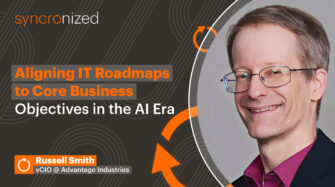Table of contents
Episode Summary
This episode of Syncronized tackles the challenging IT staffing landscape, focusing on recruiting and retention for Managed Service Providers (MSPs). Host Brandon Garcin and guest James Horne, Sr. Director of Delivery at AxiomPath, discuss the increasing skill gaps, diverse tech requirements, and the difficulties MSPs face in attracting and retaining top talent. James emphasizes the importance of understanding company culture, vision, and team dynamics when hiring. He advocates for building strong client relationships and tailoring recruiting strategies to each MSP’s specific needs.
James and Brandon explore the evolving role of AI in recruiting, including its benefits and potential pitfalls. They discuss how AI can automate tasks like transcribing calls and generating candidate summaries, freeing recruiters to focus on building relationships. They also touch on the importance of human interaction in the hiring process and the need for candidates to avoid over-reliance on AI-generated resumes.
Finally, the conversation shifts to the concept of an “elastic bench,” a flexible staffing model allowing MSPs to scale their workforce up or down as needed. James highlights the benefits of this approach, particularly for project-based work and adapting to rapidly changing market demands. This model allows MSPs to offer a wider range of services while maintaining control over costs and overhead.
Guest-at-a-Glance
💡 Name: James Horne
💡What they do: Sr. Director of Delivery
💡Company: AxiomPath
💡Noteworthy: Seasoned IT staffing expert focused on relationship-driven recruiting and AI integration.
💡 Where to find them: LinkedIn
Key Insights
The Power of Relationship-Driven Recruiting
Effective recruiting goes beyond simply matching skills to job descriptions. Building strong relationships with both clients and candidates is crucial for long-term success. Understanding a client’s vision, culture, and team dynamics enables recruiters to find candidates who are not only technically proficient but also a good fit for the organization. Similarly, nurturing relationships with candidates helps ensure a positive experience, even if they’re not the right fit for a particular role. This approach fosters trust and loyalty, leading to referrals and repeat business. Prioritizing relationships over simply filling positions builds a foundation for long-term success in the IT staffing industry.
AI: The Double-Edged Sword of Recruiting
Artificial intelligence offers powerful tools for streamlining recruiting processes. AI can automate time-consuming tasks, such as transcribing interviews and summarizing candidate profiles. This efficiency allows recruiters to focus on building relationships and making informed decisions. However, over-reliance on AI can be detrimental. Candidates should avoid using AI-generated resumes that lack authenticity, while recruiters must be wary of potential biases embedded within AI algorithms. Ultimately, AI should be viewed as a tool to enhance, not replace, the human element of recruiting. Finding the right balance between automation and human interaction is key to leveraging AI’s full potential.
Embracing the Elastic Bench: Adapting to Change
The rapidly changing IT landscape demands a more agile approach to workforce management. The “elastic bench” model offers a flexible solution, allowing MSPs to scale their workforce up or down as needed. This model breaks free from the traditional constraints of long-term hiring plans, enabling MSPs to quickly adapt to evolving project needs and market demands. By engaging contractors for specific projects or timeframes, MSPs can access specialized skills and expertise without the commitment of full-time hires. This flexibility also allows MSPs to say yes to more opportunities, expanding their service offerings and boosting revenue. Embracing the elastic bench empowers MSPs to navigate the dynamic IT landscape with greater agility and efficiency.
Listener Takeaways
The MSP Staffing Challenge
Many MSPs struggle with staffing due to outdated rate cards, reliance on multiple staffing agencies that may not fully understand their needs, and a disconnect from the realities of the current hiring market. This often leads to low-quality candidates, frustration for hiring managers, and a cycle of blame. Furthermore, traditional MSPs often operate with outdated practices, failing to recognize the shift in candidate expectations, particularly regarding remote work and flexibility.
“A lot of these MSPs are still operating in, you know, 2014, 2018, where it’s very rules-based, ‘we’ve got a rate card,’ and they don’t understand the world’s changed.”
Understanding the Nuances of IT Roles
Recruiting in the IT sector requires a deep understanding of the various specializations and niches within the field. The sheer number of programming languages, security protocols, and IT management approaches can be overwhelming for those unfamiliar with the tech landscape. It’s important to discern not only the hard skills required for a role, but also the soft skills and cultural fit that will ensure a candidate’s success within a specific team and organization. This nuanced understanding is often lacking in traditional HR or recruiting professionals without a strong technical background.
“There’s just so much nuance in there that’s difficult to kind of navigate. Cost being another difficult area here. I know quite a few MSPs that struggle to hang on to folks because the Oracles and Microsofts and Dells and Amazons of the world are able to pay way higher rates.”
Leveraging AI for Sourcing and Streamlining
While AI can’t replace the human element of recruiting, it can be a powerful tool for sourcing candidates, streamlining processes, and reducing bias. AI-powered tools can transcribe calls, analyze resumes for keywords, and generate candidate summaries, freeing recruiters to focus on higher-level tasks. This automation helps create a more efficient and data-driven approach to recruiting. However, it’s crucial to use AI strategically and avoid simply relying on automated systems without human oversight.
“All the calls that we’re doing are being transcribed and saved in our database so we can go back and search through these things later. So it’s not always recreating the wheel.”
The Future of Work: Project-Based and Flexible
The traditional model of full-time employment is evolving, and the rise of project-based work creates opportunities for both MSPs and IT professionals. The elastic bench model provides a flexible approach to staffing, allowing MSPs to engage skilled professionals for specific projects or timeframes. This model offers numerous benefits, including access to specialized expertise, increased agility, and improved cost management. It also provides IT professionals with greater flexibility and the chance to work on diverse projects.
“They might need them 40 hours this week, 40 hours in three weeks, 20 hours this week. It is flexible. A lot of the relationships that we build is that people are open to project work.”

Syncronized is the MSP podcast that drives MSP growth, from startup to scale-up. In each episode, we dive into the topics that matter most to IT providers, such as automation, AI, service delivery and profitability. Join us as we engage with experts and gain hands-on insights and practical advice you can directly apply to propel your business forward.
Share













